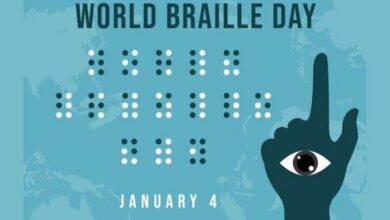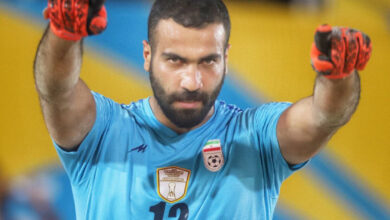Search Results for: world
-
Four Iranians nominated for world futsal awards
TEHRAN – Four Iranian futsal figures have been nominated for the 26th edition of the annual World Futsal Awards, released…
Read More » -
news

World Braille Day aims to ensure no one is left in dark
TEHRAN –Observed annually on January 4, World Braille Day highlights the importance of Braille in empowering visually impaired individuals, promoting…
Read More » -
news

World title is within reach: Mohammad Dastan
TEHRAN — Iran national beach soccer goalkeeper Mohammad Dastan believes the team have put their elimination from the 2025 Beach…
Read More » -
news

Iran move up in FIFA Women's World Ranking
TEHRAN – Iran’s women’s football team moved up two spots to 68th in the latest FIFA Women’s World Ranking. World…
Read More » -
news

Iran end in 2025 World Women's Handball Championship without single win
TEHRAN – Iran lost to Kazakhstan 24-19 in the Placement Match 31/32 of the 2025 President’s Cup Wednesday night. Kazakhstan…
Read More » -
news

Iran to meet Belgium, Egypt and New Zealand: 2026 FIFA World Cup
TEHRAN – Iran national football team discovered their opponents at the 2026 FIFA World Cup. The draw for the 2026…
Read More » -
news

Iranian taekwondo athletes win two more gold at 2025 World U21
TEHRAN – Iran’s Mobina Nematzadeh and Radin Zeinali won two gold medal at the 2025 World U21 Taekwondo Championships on…
Read More » -
news

Gholami takes gold at 2025 World U21 Taekwondo Championships
TEHRAN – Amirreza Gholami of Iran won a gold medal at the 2025 World U21 Taekwondo Championships on Thursday. Gholami…
Read More » -
news

Iran changes mind about not attending 2026 FIFA World Cup draw
TEHRAN – Iran’s football federation has reconsidered its stance on attending the 2026 FIFA World Cup draw and will send…
Read More » -
news

Iran fail to reach Women’s Kabaddi World Cup 2025 final
TEHRAN – India marched into the final of the Women’s Kabaddi World Cup 2025 with a 33-21 win over Iran…
Read More »